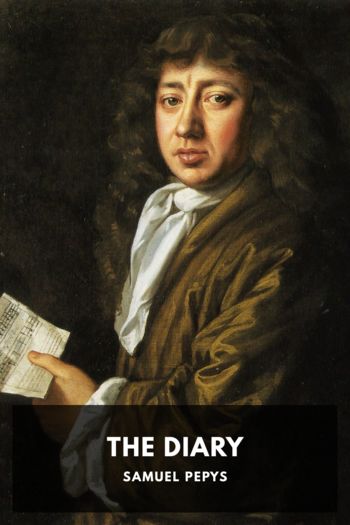The Diary, Samuel Pepys [e reader books TXT] 📗

- Author: Samuel Pepys
Book online «The Diary, Samuel Pepys [e reader books TXT] 📗». Author Samuel Pepys
Sergeant John Turner, husband of Jane Pepys, who lived in Salisbury Court. ↩
The King’s letter to the Council for this purpose was read on November 19th. —B. ↩
Lord Braybrooke says probably John Buck, D.D., who was vicar of Stradbrook, Suffolk, and published, in 1660, a Thanksgiving Sermon, preached at St. Paul’s, but see ante, note 1215, for Dr. James Buck. ↩
“Woe unto thee, Chorazin! woe unto thee, Bethsaida!” etc.
—Matthew 11:21; Luke 10:13↩
The Count Brahé. ↩
And that, too, in the river Thames itself. The right of obliging ships of all nations to lower topsails, and strike their flag to the English, whilst in the British seas, and even on the French coasts, had, up to this time, been rigidly enforced. When Sully was sent by Henry IV, in 1603, to congratulate James I on his accession, and in a ship commanded by a vice-admiral of France, he was fired upon by the English Admiral Mansel, for daring to hoist the flag of France in the presence of that of England, although within sight of Calais. The French flag was lowered, and all Sully’s remonstrances could obtain no redress for the alleged injury. According to Rugge, Holmes had insisted upon the Swede’s lowering his flag, and had even fired a shot to enforce the observance of the usual tribute of respect, but the ambassador sent his secretary and another gentleman on board the English frigate, to assure the captain, upon the word and honour of an ambassador, that the king, by a verbal order, had given him leave and a dispensation in that particular, and upon this false representation he was allowed to proceed on his voyage without further question. This want of caution, and disobedience of orders, fell heavily on Holmes, who was imprisoned for two months, and not re-appointed to the same ship. Brahé afterwards made a proper submission for the fault he had committed, at his own court. His conduct reminds us of Sir Henry Wotton’s definition of an ambassador—that he is an honest man sent to lie abroad for the good of his country. A pun upon the term lieger—ambassador. —B. ↩
Edward Hyde, first Earl of Clarendon, was twice married. His first wife was Anne, daughter of Sir George Ayliffe, Bart., of Gretenham, in the county of Wilts. He married her in 1628, when he was only twenty years old, and she died of the smallpox six months afterwards, before any child was born. In 1634 he married Frances, daughter of Sir Thomas and Lady Aylesbury, by whom he had four sons and two daughters. Sir Thomas Aylesbury, Bart., had been secretary to George, Duke of Buckingham, and through his influence was made Master of Requests and Master of the Mint. He died at Breda in 1657, aged eighty-one. ↩
Fondness, foolishness.
“Fondness it were for any, being free,
To covet fetters, tho’ they golden be.”
—M. B. ↩
Philaster; or, Love Lies A-Bleeding, a tragicomedy, by Beaumont and Fletcher, acted at court in 1613. ↩
Samuel, son of Lord Chief Justice Pepys. ↩
Letter on Liberty and Necessity, by Thomas Hobbes, 1654. ↩
Smallwood, poser at St. Paul’s School (see February 4th, 1663–64). ↩
The edition of Camden’s Britannia, now in the Pepysian Library, is that of London, 1695. ↩
A mistake. According to the journals, £1,200,000. And see Diary, February 29th, 1663–64. —M. B. ↩
Martha Batten, afterwards married to Mr. Castle. ↩
Savill, the painter of Cheapside, is not mentioned by Walpole. ↩
Richard Dukes on was the rector of the parish at this time. ↩
“Every good gift and every perfect gift is from above.”
Epistle of James 1:17↩
Major-General Edward Massey (or Massie), son of John Massie, was captain of one of the foot companies of the Irish Expedition, and had Oliver Cromwell as his ensign (see Peacock’s Army Lists in 1642, p. 65). He was Governor of Gloucester in its obstinate defence against the royal forces, 1643; dismissed by the self-denying ordinance when he entered Charles II’s service. He was taken prisoner at the battle of Worcester, September 3rd, 1651, but escaped abroad. ↩
This is a strange use of the word Tory, and an early one also. The word originally meant bogtrotters or wild Irish, and as Penn was Governor of Kildare these may have been some of his Irish followers. The term was not used politically until about 1679. ↩
Lord Sandwich’s Journal has been printed by Kennett. See note 1338. —B. ↩
The Ironmongers’ Company possess in trust an enormous sum, left by Thomas Betton, for the redemption of Christian slaves in Barbary. Since Lord Exmouth’s expedition, no claims have arisen upon the fund, which is now administered for other purposes, under the direction of the Court of Chancery. —B. ↩
John Dugdale, Windsor Herald. ↩
Christopher, first Lord Hatton. Died 1670. ↩
Sarah did not stay long with Mrs. Pepys, who was continually falling out with her. She left to enter Sir William Penn’s service. ↩
Henry VII did not do this, and Selden did not say he did. It was, as Pepys says, “a lie.” In May, 1670, Arthur Capel, the first Earl of Essex, was sent as Ambassador Extraordinary to Denmark in a ship of war. He





Comments (0)